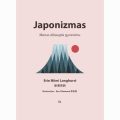 Original language:
English
Original language:
English Translated from: English
Authors: Longhurst, Erin Niimi
Translated by: Puzauskaitė, Agnė
ISBN: 978-5-415-02525-1
Published in: Vilnius
Published on: 2018
Publisher: Vaga
This book is divided into three chapters: Kokoro (Heart and Mind; 心), Karada (Body; 体), Shukanka (Habit Formation; 習慣 化). In the first chapter, the author talks about how one can discover his “ikigai” i.e. goal which leads the person forward. Every person’s “Ikigai” is different. It can be: work, love, nature, family and self-care. You may have already discovered your “Ikigai” but you haven’t realized it yet. It’s like fuel for a human motor without which it’s hard to get your feet out of bed in the morning. What follows is wabi-sabi, the ability to come to terms with the turmoil and temporality of life. The author herself mentions that of all the concepts mentioned in the book, this is the most difficult to explain. The original meaning of the word “wabi” is a sense of distance and loneliness, as well as the paradoxical beauty of imperfection. Meanwhile, “sabi” has several meanings: twisted, bent. But most of the time, it means the beauty of aging. So wabi-sabi is what is not complete, not perfect, and will not last forever. The first chapter is completed by getting acquainted with the art of “kintsugi” – handling broken objects and admiring them. As the author said, “difficulties form our personalities. It’s like having to taste sourness to feel something sweet. ”This is the “kintsugi ”philosophy. Putting the dishes out of their crumbs, gluing them with varnish with gold makes them more beautiful than they were. Instead of the item being thrown away or despised for its flaws, it is cherished. Their weaknesses become strength.
The second chapter begins with a story about health from nature called Shinrin-yoku. Shinri-yoku is a healing practice that uses the human presence in nature and seeks to improve an individual’s mental and physical health. This practice is based on scientific facts that being in nature improves human health. The author has also given a six-step shinrin-yoku guide: 1) Leaving all technology at home. 2) Going off a beaten track 3) Feeling in the environment. 4) Silence 5) Practice attentive assimilation. 6) “It’s not a hike or a test of endurance.” So five or ten minutes is enough. One cannot talk about Japan without mentioning “tabemono” (food). The longevity of Japanese is associated with their eating habits and food choices. Speaking about food, the author not only teaches how to eat Japanese food correctly but also how to cook the most popular Japanese dishes yourself. Author doesn’t forget to introduce various Japanese dishes and preparation of Bento boxes. Hot springs and baths are another important part of everyday life in Japan. Not only is the etiquette of hot springs reviewed, tips on how to wear an informal kimono that is worn in the summer, but also how to make bath salt yourself and enjoy the hot spring at home. Finally, the chapter ends with introduction to a Japanese house. It is mentioned how the Japanese make good use of every part of the space in a house, what are the elements of a home. It is important to mention that Japanese houses are constantly changing as the rooms are separated by a moving fusuma (sliding wall). The author concludes the chapter with tips on how to make a Japan-inspired home.
The third and final chapter tells about Shukanka – habit formation. Shukanka shows that important changes do not happen in one day. These changes occur gradually. After all, to start cooking, you don’t start cooking the most difficult dishes, but you start with simpler, less complex dishes. Thus, the author advises not only to form habits slowly, but also to make lists for various tasks or other purposes, because a person feels joy after completing a task.
The author of this book is Erin Niimi Longhurst, a writer and blogger of Japanese and British descent. She currently works as a social media and digital technology consultant, helping charities build relationships with the people they care to reach by telling their stories online. The author graduated in social anthropology from the University of Manchester. She also has a blog called Island Bell that writes about food, travel and lifestyle.
